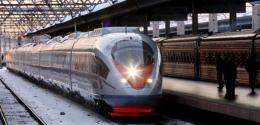Russian railways enter modern age with new express

Famed for the legendary trains that clank across seven time zones on its Trans-Siberian railroad, Russia this week entered the modern railway age with its first high-tech express train.
The Sapsan train, whose gaudy red bodywork is in sharp contrast to the bottle green that adorns most Russian trains, started running Thursday on the route between Moscow and Saint Petersburg.
The route between the country's two main cities was until now largely served by overnight trains which shared the same romance as the Trans-Siberian railway but crawled to their destination in some eight hours.
But now travellers can take the Sapsan (Peregrine Falcon) which cuts journey time between the two cities to just three hours forty five minutes and appears set to revolutionize the Russian concept of train travel.
It is a centrepiece of Russia's plans to modernize its state-owned railways and integrate a network that extends as far afield as China and Mongolia with the railway systems of Europe.
For all the fanfare, the unveiling of the new pride of Russia's railways was overshadowed by the deadly bombing of the luxury Nevsky Express train last month on the same Moscow-Petersburg railway.
The blast late on November 27 derailed the Nevsky Express, killing 27 people and wounding about 100 more. It was claimed by the so-called "Caucasus Emirate", an umbrella group uniting various militant Islamist factions.
By chance, part of the Sapsan was undergoing tests close to where the blast hit and was involved in rescue efforts, carrying several hundred stranded passengers away from the site of the attack.
In the Soviet-era train stations of Moscow and Saint Petersburg, the Sapsan train looks like it has arrived from another planet as it sits in the tracks next to its long-serving Russian-built brethren.
The train was designed by German engineering giant Siemens, which in 2006 signed a contract with Russian Railways (RZhD) to supply eight of its Velaro trains, in the latest example of German-Russian economic cooperation.
It has a highest speed of 250 kilometres (150 miles) an hour for the 635 kilometre (400 mile) journey, an almost rocket-like velocity compared with the trudge of most Russian trains.
Previous day trains along the route had taken four and a half hours.
The contrast with Russian trains of the past is even more striking inside with automatic doors, huge glass picture windows and innovations like television in first class.
Even more astonishing for anyone who has travelled on Russian trains in the past is the blanket ban on smoking, a major irritant for many train travellers in the country.
"It feels like a TGV!" exclaimed Mikhail, 43, as he climbed aboard in Moscow, referring to the French high speed train that transformed Europeans' expectations of rail travel.
Alexei, 28, a IT consultant decided to buy a one-day return ticket for one of the first journeys for the sheer pleasure of travelling on the train.
"When I compare with other Russian trains, I see that our railways have moved on to another level."
The cost is set at 115 dollars for a single and 175 dollars in first class.
"Usually I take plane. But with the Sapsan it's quicker now that we leave from the middle of the city and arrive in the middle of the city. In the end, it costs less," said Mikhail, a resident of Saint Petersburg.
Vladimir Yakunin, head of RZhD which is running the new train, hailed the Sapsan as "not just a train, but another life, another technology, another form of transport."
The Moscow-Petersburg railway has the heaviest passenger traffic of any rail line in Russia, and, in 2008, 6.5 million people took trains between the two cities, according to RZhD spokesman Sergei Slutskov.
"We are sure that we will attract many people who now take the plane," he said.
(c) 2009 AFP

















